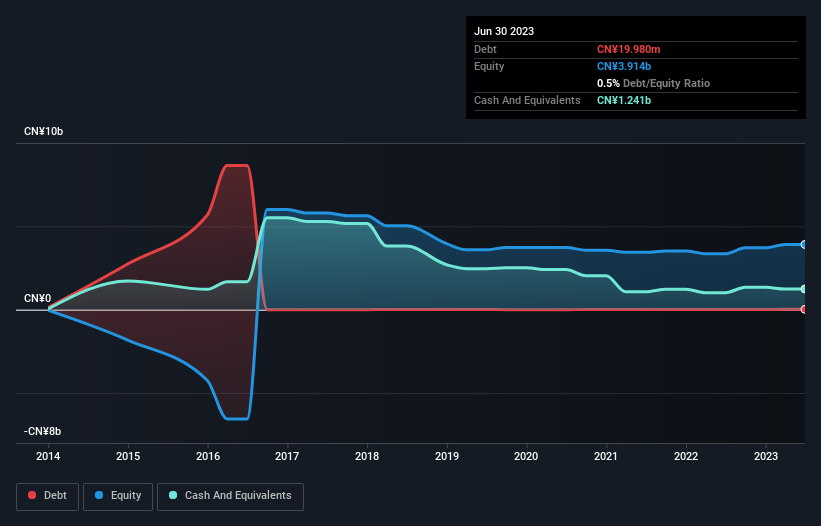
Legendary fund manager Li Lu (who Charlie Munger backed) once said, 'The biggest investment risk is not the volatility of prices, but whether you will suffer a permanent loss of capital.' It's only natural to consider a company's balance sheet when you examine how risky it is, since debt is often involved when a business collapses. We can see that Meitu, Inc. (HKG:1357) does use debt in its business. But is this debt a concern to shareholders?
What Risk Does Debt Bring?
Generally speaking, debt only becomes a real problem when a company can't easily pay it off, either by raising capital or with its own cash flow. Part and parcel of capitalism is the process of 'creative destruction' where failed businesses are mercilessly liquidated by their bankers. However, a more usual (but still expensive) situation is where a company must dilute shareholders at a cheap share price simply to get debt under control. By replacing dilution, though, debt can be an extremely good tool for businesses that need capital to invest in growth at high rates of return. The first thing to do when considering how much debt a business uses is to look at its cash and debt together.
Check out our latest analysis for Meitu
What Is Meitu's Net Debt?
As you can see below, at the end of June 2023, Meitu had CN¥20.0m of debt, up from CN¥10.0m a year ago. Click the image for more detail. However, its balance sheet shows it holds CN¥1.24b in cash, so it actually has CN¥1.22b net cash.

A Look At Meitu's Liabilities
The latest balance sheet data shows that Meitu had liabilities of CN¥1.14b due within a year, and liabilities of CN¥215.3m falling due after that. Offsetting this, it had CN¥1.24b in cash and CN¥306.1m in receivables that were due within 12 months. So it can boast CN¥187.4m more liquid assets than total liabilities.
Having regard to Meitu's size, it seems that its liquid assets are well balanced with its total liabilities. So it's very unlikely that the CN¥12.0b company is short on cash, but still worth keeping an eye on the balance sheet. Simply put, the fact that Meitu has more cash than debt is arguably a good indication that it can manage its debt safely.
It was also good to see that despite losing money on the EBIT line last year, Meitu turned things around in the last 12 months, delivering and EBIT of CN¥103m. There's no doubt that we learn most about debt from the balance sheet. But it is future earnings, more than anything, that will determine Meitu's ability to maintain a healthy balance sheet going forward. So if you're focused on the future you can check out this free report showing analyst profit forecasts.
Finally, while the tax-man may adore accounting profits, lenders only accept cold hard cash. Meitu may have net cash on the balance sheet, but it is still interesting to look at how well the business converts its earnings before interest and tax (EBIT) to free cash flow, because that will influence both its need for, and its capacity to manage debt. Over the last year, Meitu actually produced more free cash flow than EBIT. That sort of strong cash conversion gets us as excited as the crowd when the beat drops at a Daft Punk concert.
Summing Up
While we empathize with investors who find debt concerning, you should keep in mind that Meitu has net cash of CN¥1.22b, as well as more liquid assets than liabilities. The cherry on top was that in converted 431% of that EBIT to free cash flow, bringing in CN¥446m. So we don't think Meitu's use of debt is risky. When analysing debt levels, the balance sheet is the obvious place to start. However, not all investment risk resides within the balance sheet - far from it. For instance, we've identified 2 warning signs for Meitu that you should be aware of.
If, after all that, you're more interested in a fast growing company with a rock-solid balance sheet, then check out our list of net cash growth stocks without delay.
New: Manage All Your Stock Portfolios in One Place
We've created the ultimate portfolio companion for stock investors, and it's free.
• Connect an unlimited number of Portfolios and see your total in one currency
• Be alerted to new Warning Signs or Risks via email or mobile
• Track the Fair Value of your stocks
Have feedback on this article? Concerned about the content? Get in touch with us directly. Alternatively, email editorial-team (at) simplywallst.com.
This article by Simply Wall St is general in nature. We provide commentary based on historical data and analyst forecasts only using an unbiased methodology and our articles are not intended to be financial advice. It does not constitute a recommendation to buy or sell any stock, and does not take account of your objectives, or your financial situation. We aim to bring you long-term focused analysis driven by fundamental data. Note that our analysis may not factor in the latest price-sensitive company announcements or qualitative material. Simply Wall St has no position in any stocks mentioned.
About SEHK:1357
Meitu
An investment holding company, engages in the development and provision of products that streamline the production of photo, video, and design with other AI-powered products in Mainland China and internationally.
Excellent balance sheet with proven track record.
Similar Companies
Market Insights
Community Narratives



